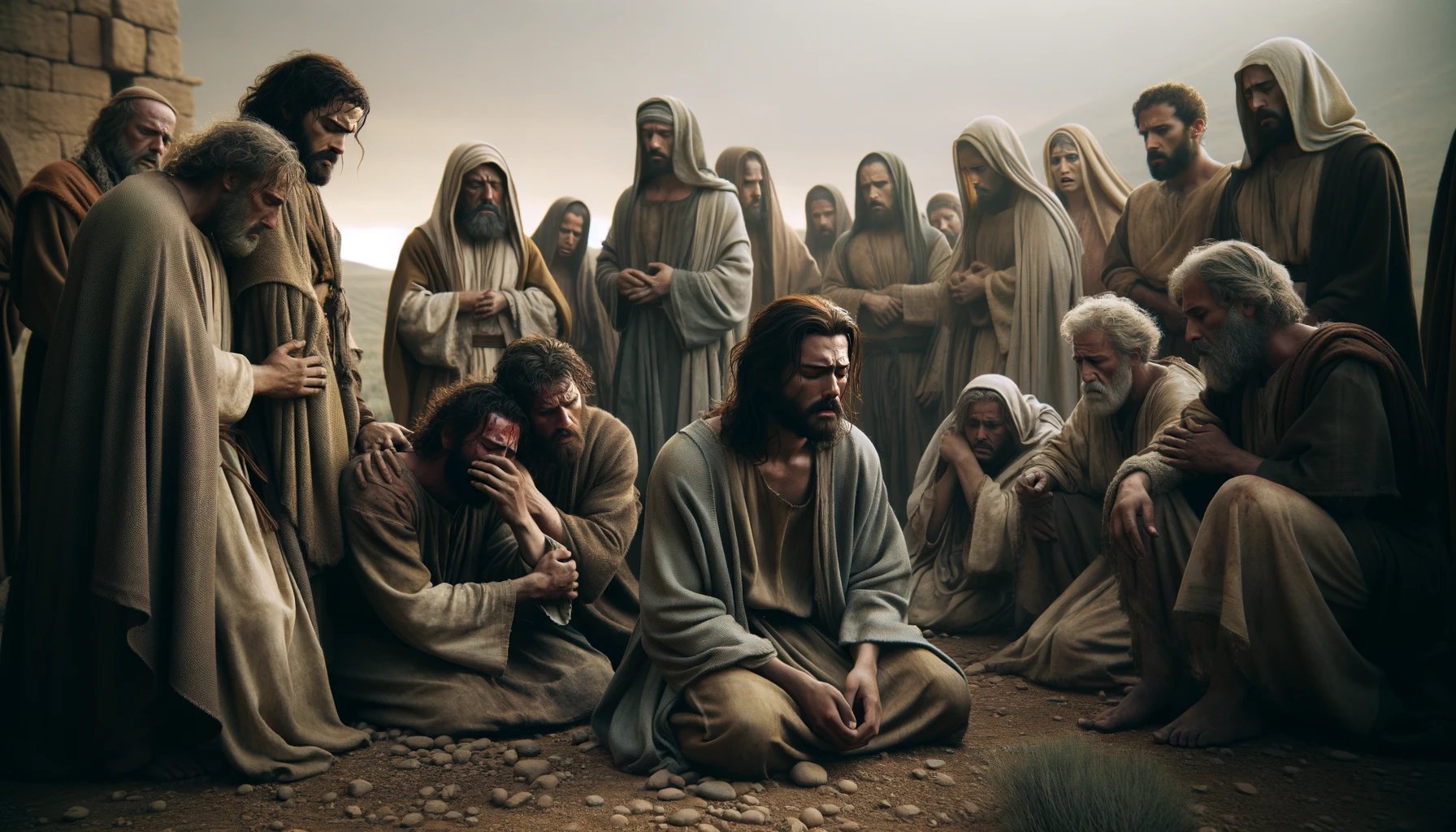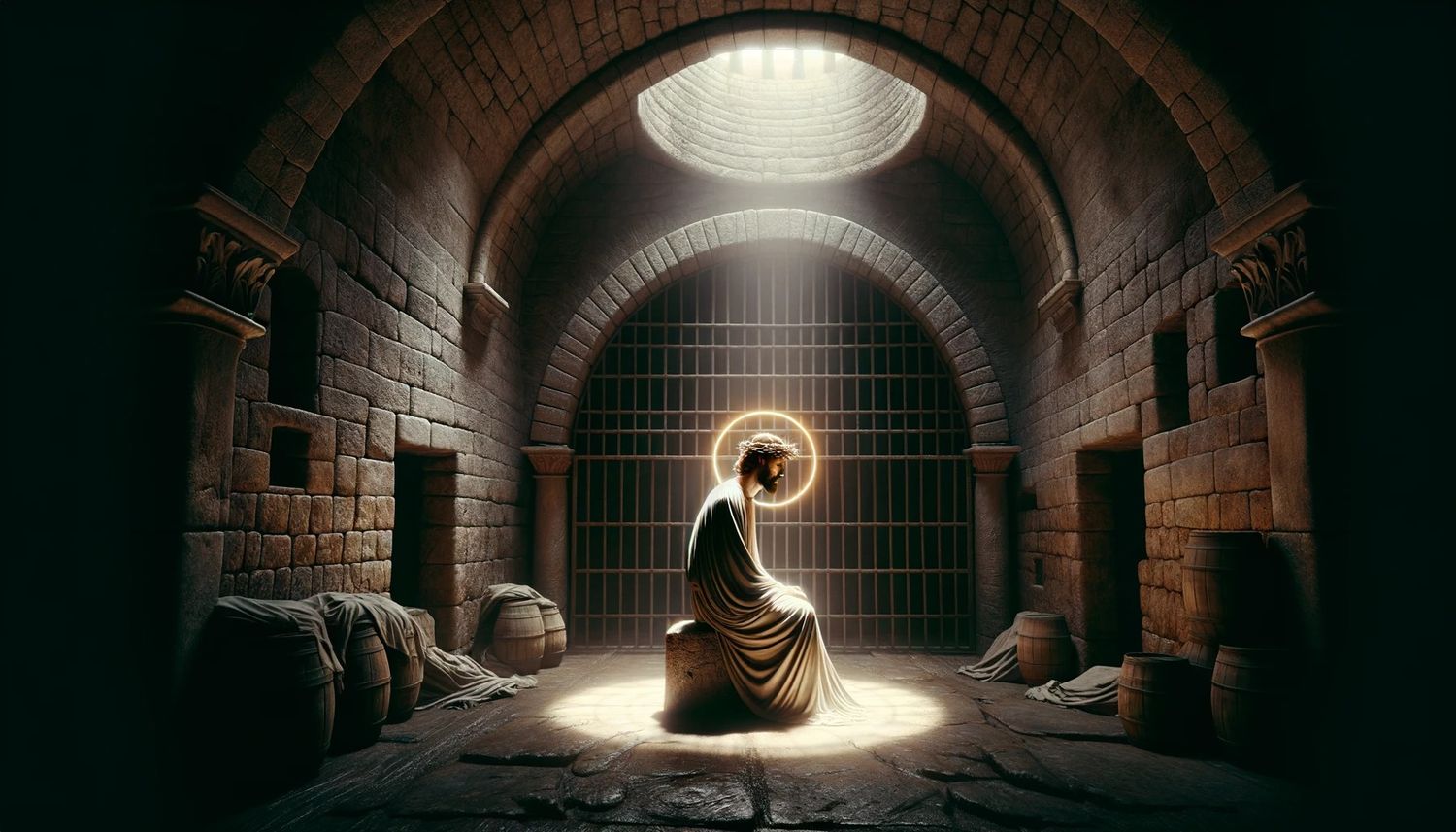Home>Theology and Spirituality>How Was John The Baptist Beheaded


Theology and Spirituality
How Was John The Baptist Beheaded
Published: February 23, 2024
Ericka Andersen, an editor at Christian.net, expertly merges digital strategy with content creation, focusing on faith and societal issues. Her communication skills enhance the platform's engaging narratives, fostering meaningful dialogue on belief's impact on society.
Discover the biblical account of John the Baptist's beheading and its significance in theology and spirituality. Explore the historical and religious context of this pivotal event.
(Many of the links in this article redirect to a specific reviewed product. Your purchase of these products through affiliate links helps to generate commission for Christian.net, at no extra cost. Learn more)
Table of Contents
Introduction
The beheading of John the Baptist is a poignant and tragic event that holds significant historical and religious importance. John the Baptist, a central figure in Christianity and Islam, was a revered prophet and the forerunner of Jesus Christ. His life and ministry were characterized by unwavering devotion, moral integrity, and a profound commitment to his divine calling.
The circumstances surrounding John the Baptist's beheading are shrouded in political intrigue, religious conflict, and personal vendettas, making it a compelling and somber chapter in religious history. This pivotal event not only marked the end of John's earthly journey but also served as a testament to the clash between spiritual righteousness and worldly powers.
The narrative of John the Baptist's beheading is a poignant reminder of the complexities inherent in the intersection of faith, power, and human frailty. It invites contemplation on themes of martyrdom, justice, and the enduring legacy of those who fearlessly uphold their beliefs in the face of adversity.
As we delve into the circumstances leading to this tragic event and its profound implications, we gain insight into the timeless struggle between righteousness and corruption, shedding light on the enduring significance of John the Baptist's unwavering commitment to his divine mission.
Read more: Who Beheaded John The Baptist
The Life and Ministry of John the Baptist
John the Baptist, also known as John the Baptizer, was a pivotal figure in religious history, revered for his unwavering commitment to his divine calling and his pivotal role as the herald of Jesus Christ. His life and ministry were characterized by a profound sense of purpose, moral fortitude, and a radical approach to spiritual transformation.
John was born to elderly parents, Zechariah and Elizabeth, who had longed for a child and were blessed with John through divine intervention. From his early years, John exhibited a deep spiritual inclination, and as he matured, he embarked on a transformative journey of self-discovery and divine revelation.
His ministry was marked by a radical call to repentance and baptism as a symbol of spiritual purification. John preached in the wilderness, compelling people to turn away from sin and embrace a life of righteousness. His message resonated with multitudes, drawing people from various walks of life to the banks of the Jordan River, where he baptized them as a symbol of their commitment to spiritual renewal.
John's ascetic lifestyle, clad in camel's hair with a leather belt around his waist and sustained by a diet of locusts and wild honey, exemplified his detachment from worldly comforts and his singular focus on his divine mission. His unyielding dedication to his calling and his uncompromising stance against moral decadence earned him the reputation of a fearless and uncompromising prophet.
As the forerunner of Jesus Christ, John proclaimed the imminent arrival of the Messiah, preparing the hearts of the people for the transformative message that Jesus would bring. His humility and unwavering commitment to his divine purpose set the stage for the profound impact of Jesus' ministry.
John's influence extended beyond his compelling sermons and baptisms. His moral authority and spiritual integrity posed a challenge to the religious and political establishments of his time, drawing both admiration and scrutiny. His fearlessness in confronting the religious elite and his unwavering dedication to truth and righteousness made him a figure of both reverence and controversy.
The life and ministry of John the Baptist serve as a timeless testament to the power of conviction, the transformative impact of spiritual renewal, and the enduring legacy of those who fearlessly uphold their beliefs. His unwavering commitment to his divine calling and his pivotal role in preparing the way for Jesus Christ continue to inspire and resonate across generations, embodying the timeless pursuit of spiritual truth and moral integrity.
The Arrest of John the Baptist
The arrest of John the Baptist marked a pivotal turning point in his life and ministry, setting in motion a sequence of events that would ultimately lead to his tragic demise. John's uncompromising stance on moral righteousness and his fearless confrontation of societal injustices had drawn the attention of both religious authorities and political leaders, making him a figure of both admiration and concern.
The catalyst for John's arrest stemmed from his vocal condemnation of the illicit relationship between Herod Antipas, the tetrarch of Galilee and Perea, and Herodias, the wife of his brother, Philip. John fearlessly denounced this union as unlawful, citing the moral transgressions inherent in their marriage. His bold critique of Herod's actions posed a direct challenge to the political establishment and the moral fabric of the society.
Herodias, incensed by John's public censure and recognizing the threat he posed to her position and reputation, harbored a deep-seated animosity towards him. Herod, torn between his respect for John as a holy and righteous man and his desire to appease Herodias, found himself entangled in a web of conflicting loyalties and personal ambitions.
The arrest of John the Baptist was orchestrated by Herodias' daughter, Salome, who, prompted by her mother's vengeful agenda, danced before Herod and his guests, leading to Herod's rash promise to grant her any request. Exploiting this opportunity, Salome, at her mother's behest, demanded the head of John the Baptist on a platter.
Herod, deeply grieved by this request, was caught in a dilemma, torn between his oath to fulfill Salome's request and his reverence for John. However, succumbing to the pressures of pride, power, and public perception, Herod reluctantly ordered the execution of John the Baptist, thereby succumbing to the manipulative schemes of Herodias and her daughter.
The arrest of John the Baptist stands as a stark illustration of the collision between moral righteousness and the corrupting influences of power and personal vendettas. It serves as a sobering reminder of the perils faced by those who fearlessly confront societal injustices and the enduring legacy of individuals who uphold their convictions in the face of adversity.
The arrest of John the Baptist not only sealed his fate but also underscored the timeless struggle between truth and tyranny, righteousness and moral compromise. It set the stage for the tragic events that would culminate in his unjust execution, leaving an indelible mark on the annals of religious history and serving as a testament to the enduring legacy of a prophet who remained steadfast in his commitment to divine truth.
The Request for John the Baptist's Execution
The request for John the Baptist's execution unfolded against a backdrop of political intrigue, personal vendettas, and moral conflict, encapsulating the complex interplay of power and righteousness. The catalyst for this fateful request lay in the vocal condemnation by John the Baptist of the illicit relationship between Herod Antipas, the tetrarch of Galilee and Perea, and Herodias, the wife of his brother, Philip. John's unwavering commitment to moral integrity and his fearless critique of Herod's actions posed a direct challenge to the societal norms and the political establishment.
Herodias, aggrieved by John's public censure and recognizing the threat he posed to her position and reputation, harbored a deep-seated animosity towards him. Herod, torn between his respect for John as a holy and righteous man and his desire to appease Herodias, found himself entangled in a web of conflicting loyalties and personal ambitions.
The pivotal moment leading to the request for John's execution transpired during a banquet held by Herod, where Herodias' daughter, Salome, captivated the guests with her dance. Herod, in a moment of rashness and influenced by the spectacle, made a solemn oath to grant Salome any request she desired. Prompted by her mother's vengeful agenda, Salome, seizing the opportunity, demanded the head of John the Baptist on a platter.
Herod, deeply grieved by this request, was caught in a moral quandary, torn between his oath to fulfill Salome's request and his reverence for John. However, succumbing to the pressures of pride, power, and public perception, Herod reluctantly ordered the execution of John the Baptist, thereby succumbing to the manipulative schemes of Herodias and her daughter.
The request for John the Baptist's execution stands as a poignant testament to the collision between moral righteousness and the corrupting influences of power and personal vendettas. It serves as a sobering reminder of the perils faced by those who fearlessly confront societal injustices and the enduring legacy of individuals who uphold their convictions in the face of adversity.
This pivotal moment not only sealed John's fate but also underscored the timeless struggle between truth and tyranny, righteousness and moral compromise. It set the stage for the tragic events that would culminate in his unjust execution, leaving an indelible mark on the annals of religious history and serving as a testament to the enduring legacy of a prophet who remained steadfast in his commitment to divine truth.
The Beheading of John the Baptist
The beheading of John the Baptist stands as a harrowing testament to the collision between moral righteousness and the corrupting influences of power and personal vendettas. Following the fateful request made by Salome, Herod reluctantly ordered the execution of John the Baptist, succumbing to the manipulative schemes of Herodias and her daughter.
The events leading to John's beheading unfolded with tragic inevitability, as the prophet, imprisoned and isolated, faced the impending fulfillment of Herod's decree. The somber atmosphere surrounding John's imprisonment echoed the profound implications of his unwavering commitment to truth and righteousness, even in the face of imminent peril.
The circumstances of John's execution exemplified the ruthless exercise of power and the tragic consequences of moral compromise. As the executioner carried out the grim task, the prophet's life was unjustly extinguished, silencing the voice that had resounded with uncompromising calls for repentance and moral renewal.
The beheading of John the Baptist reverberates through history as a poignant symbol of the enduring struggle between spiritual integrity and the forces of corruption. It serves as a stark reminder of the perils faced by those who fearlessly confront societal injustices and the enduring legacy of individuals who uphold their convictions in the face of adversity.
The profound implications of John's beheading extend beyond the tragic loss of a revered prophet. It encapsulates the timeless struggle between truth and tyranny, righteousness and moral compromise, resonating with the enduring significance of those who fearlessly uphold their beliefs in the face of adversity.
The beheading of John the Baptist stands as a testament to the enduring legacy of a prophet who remained steadfast in his commitment to divine truth, even in the face of persecution and ultimate sacrifice. It serves as a poignant reminder of the timeless pursuit of spiritual truth and moral integrity, embodying the enduring impact of those who fearlessly uphold their beliefs in the face of adversity.
Read more: How Is John The Baptist Elijah
Conclusion
The beheading of John the Baptist stands as a poignant and tragic chapter in religious history, encapsulating the collision between moral righteousness and the corrupting influences of power and personal vendettas. The circumstances leading to this pivotal event, from John's unwavering commitment to his divine calling to the manipulative schemes that sealed his fate, underscore the timeless struggle between truth and tyranny, righteousness and moral compromise.
John the Baptist's life and ministry serve as a timeless testament to the power of conviction, the transformative impact of spiritual renewal, and the enduring legacy of those who fearlessly uphold their beliefs. His unwavering commitment to his divine calling and his pivotal role in preparing the way for Jesus Christ continue to inspire and resonate across generations, embodying the timeless pursuit of spiritual truth and moral integrity.
The arrest and subsequent beheading of John the Baptist serve as a sobering reminder of the perils faced by those who fearlessly confront societal injustices and the enduring legacy of individuals who uphold their convictions in the face of adversity. The tragic events that culminated in John's unjust execution underscore the timeless struggle between spiritual integrity and the forces of corruption, resonating with the enduring significance of those who fearlessly uphold their beliefs in the face of adversity.
The narrative of John the Baptist's beheading invites contemplation on themes of martyrdom, justice, and the enduring legacy of those who fearlessly uphold their beliefs in the face of adversity. It stands as a poignant symbol of the enduring struggle between spiritual integrity and the forces of corruption, serving as a testament to the enduring legacy of a prophet who remained steadfast in his commitment to divine truth, even in the face of persecution and ultimate sacrifice.
In conclusion, the beheading of John the Baptist holds profound historical and religious significance, serving as a poignant reminder of the timeless pursuit of spiritual truth and moral integrity. It stands as a testament to the enduring legacy of a prophet who fearlessly upheld his beliefs in the face of adversity, leaving an indelible mark on the annals of religious history and inspiring generations to uphold their convictions with unwavering dedication.














